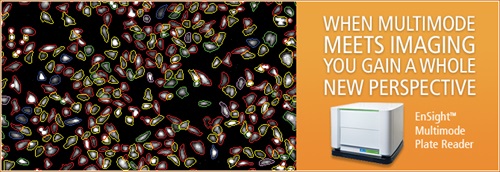Channels
Special Offers & Promotions
More Predictive Results in Cell-Based Assays: Combining Target-Based & Phenotypic Approaches Using the New EnSight Plate Reader Webinar
Gaining more predictive results in anti-cancer drug discovery
In this webinar, our expert panel of speakers will introduce the new EnSight™ Multimode Plate Reader from PerkinElmer, which features well-imaging technology in combination with labeled and label-free detection technologies.
Guest speaker Dr. Philip Gribbon (European ScreeningPort, Hamburg) will discuss the use of the EnSight system in anti-cancer drug discovery, for testing cell viability and proliferation in phenotypic readouts. Dr. Gribbon will present results obtained using EnSight, comparing the use of digital phase-contrast imaging and ATP detection for routine profiling of 4 cancer cell lines against a panel of standard cytotoxic and anti-cancer compounds.
You will learn:
- How the EnSight system can help you to generate more predictive data earlier in the drug discovery process
- How to improve your data quality and reduce your costs in cell-based assays
- How the EnSight system’s imaging capabilities make it an ideal instrument for use in anti-cancer drug discovery
Featured Speaker
Philip Gribbon, PhD - Chief Scientific Officer, European ScreeningPort, Hamburg, Germany
Dr. Philip Gribbon is the Chief Scientific Officer at the European ScreeningPort (ESP), a public-private partnership based in Hamburg Germany, which works mainly with academic research institutes in the area of drug discovery. The ESP uses a range of high throughput screening (HTS) systems and assay methods and provides support for biomarker studies within clinical and pre-clinical research projects. Since the setup of the ESP, Dr. Gribbon has worked in close collaboration with leading life-science industry partners, such as PerkinElmer, to help validate novel technologies which can directly apply to projects. Previously, Dr. Gribbon has worked at Pfizer Global Research on hit discovery using HTS technologies and gained considerable experience in drug discovery across several target classes. Later, at GSK, he led a team of physicists with the remit of increasing the impact of biophysical methods on the pharmaceutical R&D process. Dr. Gribbon did his undergraduate and PhD studies at Imperial College, London and served as a post-doctoral researcher at the University of Manchester, working on how the biophysical properties of proteoglycans help define the mechanical properties of cartilage in health and disease.
Media Partners



